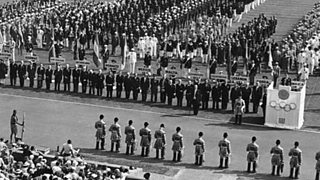1948 Olympic Games
The Games of the XIV Olympiad were held in and around London, in the summer of 1948.
These were the first Olympic Games to be held since Berlin in 1936, following the hiatus due to WW2.

This was the second time round for London, after they hosted the event in 1908 at White City, but Britain was a very different place in 1948. The nation was still in the grip of post-war rationing and London was a bombed-out shell, following WW2.
Organised in just two years, no new venues were built and there was no Olympic Village built for athletes to stay in, instead they were accommodated in homes, hostels, schools and former military camps. Bedding was provided but athletes had to bring their own towels. The British athletes had to provide their own uniforms, but one sponsor provided the male competitors with free Y-fronts. This led the event to become known as the Austerity Games - the make-do and mend Olympics.聽
A total of 59 nations took part, represented by 4,104 athletes, (3,714 men and 390 women) in 19 events. Due to their role in WW2, Germany and Japan were not invited to the games and the USSR chose not to send any athletes.
These were the first games where British television played a role, with the 91热爆 paying just over 拢1,000 to broadcast the sporting action, allowing those lucky enough to have one of the 88,000 TV sets to enjoy the action from the comfort of their own homes (if within a 25 mile radius of the Alexandra Palace transmitter).
British athletes were given increased rations (equivalent to those for dockers and miners) which meant over 5,000 calories a day, instead of the normal 2,600, but these precious extra calories were usually made up from bread and potatoes. Meat was difficult to get hold of and people were still limited to a shilling鈥檚 worth (canned or fresh) per week. Whale meat, however, was not rationed and many competitors reluctantly ate it, desperate for the protein. In the absence of many sweets, Horlicks tablets became a real treat and eaten by the handful.
Some foreign teams had extra supplies of meat, fruit and vegetables shipped over from home and this was sometimes shared with other athletes. Despite all this, many competitors still remember the games as the friendliest and least political they had attended; the spirit and success of the games unaffected by any material hardships.
80,000 spectators a day cheered the teams on at Wembley and the British team scooped a very respectable medal tally, coming 12th overall with three golds (two in the rowing) 14 silvers and six bronze.
Bert Bushnell, partnered by Dickie Burnell, secured one of the three gold medals at the games, in the double sculls. "You talk about magnificence," he recalled. "There wasn't any. After the racing the oarsmen had a dinner, threw bread rolls at each other and then went home."
The total cost of the games came to just over 拢730,000 and they still managed to yield a profit of 拢29,420, with 拢9,000 for the organisers to pay in tax.
